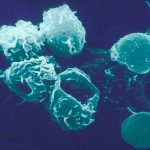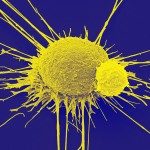Link to Pubmed [PMID] – 26131754
J Vis Exp 2015;(100)
Characterizing thymic settling progenitors is important to understand the pre-thymic stages of T cell development, essential to devise strategies for T cell replacement in lymphopenic patients. We studied thymic settling progenitors from murine embryonic day 13 and 18 thymi by two complementary in vitro and in vivo techniques, both based on the “hanging drop” method. This method allowed colonizing irradiated fetal thymic lobes with E13 and/or E18 thymic progenitors distinguished by CD45 allotypic markers and thus following their progeny. Colonization with mixed populations allows analyzing cell autonomous differences in biologic properties of the progenitors while colonization with either population removes possible competitive selective pressures. The colonized thymic lobes can also be grafted in immunodeficient male recipient mice allowing the analysis of the mature T cell progeny in vivo, such as population dynamics of the peripheral immune system and colonization of different tissues and organs. Fetal thymic organ cultures revealed that E13 progenitors developed rapidly into all mature CD3(+) cells and gave rise to the canonical γδ T cell subset, known as dendritic epithelial T cells. In comparison, E18 progenitors have a delayed differentiation and were unable to generate dendritic epithelial T cells. The monitoring of peripheral blood of thymus-grafted CD3(-/-) mice further showed that E18 thymic settling progenitors generate, with time, larger numbers of mature T cells than their E13 counterparts, a feature that could not be appreciated in the short term fetal thymic organ cultures.




